GrabCAD
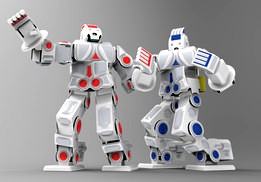
RoboSavvy Humanoid Robot
by GrabCAD
Last crawled date: 1 year, 11 months ago
*** Description of RoboSavvy Humanoid Robot V.1.4 ***
The robot is based on Bioloid GP, and all the aluminium the structural parts are same as Bioloid GP unless otherwise mentioned here. (Used the reference Bioloid GP model by Limor Schweitzer, found at https://grabcad.com/library/bioloid-gp-1)
Some minor changes are made to following structural parts of Bioloid GP.
• FR04_E120
• FR04_E120
• Wrist (New aluminium sheet part)
• Fingers (New aluminium sheet part for fingers)
• Mirror_Wrist (New aluminium sheet part)
• Mirror_Fingers (New aluminium sheet part for fingers)
AX12
One extra AX12 servo is added (other than the existing servos in Bioloid GP) to allow the robot to rotate the chest. This makes the total AX12 count as 17.
HXT900 Micro Servos
Link: http://www.hobbyking.com/hobbyking/store/__662__HXT900_9g_1_6kg_12sec_Micro_Servo.html
The robot consist 5 of these micro servo motors; one for head tilt and two on each hand for wrist rotation and finger grasp.
Size: 21 x 12 x 22 mm
Voltage: 3v ~ 6v
Weight: 11g
Speed: 0.12 sec/60 (4.8V)
Torque: 2.5 kg cm
Battery
Link: http://hobbyking.com/hobbyking/store/__24836__Zippy_K_Flightmax_1600mah_3S1P_20C_Lipoly_Battery.html
Capacity: 1600mAh
Voltage: 3S1P / 3 Cell / 11.1V
Discharge: 20C Constant
Weight: 125g (including wire, plug & case)
Dimensions: 77 x 40 x 27mm
Beaglebone Black Embedded Computer
Beaglebone Black is selected to be the brain of the robot, over Raspberry Pi; since Beaglebone Black seems to perform well compared to the price difference.
(Used the reference Beaglebone Black model found at https://github.com/lgxlogic/BeagleBoneBlack-3D-Model)
Also there will be two 3D printed cover pieces to hide and protect the board. The cover pieces are 1mm thick and can be manufactured using 3D printing or vacuum forming.
Even the Beaglebone Black is selected here for this robot; still it can accommodate either CM510 controller, Raspberry Pi or any other similar sized embedded computers in the place of Beaglebone without any modifications to the structure or shells of the robot. This is very important when considering further improvements for this open source robot.
Camera
Hema Pocket Webcam (Used the reference webcam model by Limor Schweitzer, found at https://grabcad.com/library/hema-pocket-webcam-1)
Shell
All the shell parts are designed as 0.5mm thickness. Only in the head there is a 1mm thick hollow rod to hold the servo shaft from which the head is tilted.
Many shell parts can be fixed after assembling the full robot, and there are few shells require early fix due to its geometry. For an example, head and thigh shells may require early assembly.
Read the ‘Beaglebone Black Embedded Computer’ section for the board protecting shell covers.
Your questions, suggestions and feedback are welcome. :)
*** Update V.1.1 (24th of September, 2013) ***
More internal parts are covered with shells (motors in back part of the leg).
Increased area of access with fingers (now it can hold a pen/pencil).
*** Update V.1.2 (1st of October, 2013) ***
Hip servos are covered with shells.
Modifications to hand shell (grip to hold pen/pencil).
Crawling (chest rotation with the an extra servo).
*** Update V.1.3 (2nd of October, 2013) ***
Head up and down tilt (with an extra micro servo).
Slight modifications to chest shell (to allow head tilt).
Camera position changed (allowing camera to move with the head shell).
*** Update V.1.4 (4th of October, 2013) ***
CM510 controller replaced with the Beaglebone Black embedded computer.
Slight modifications to head (to allow head to tilt up without being obstructed by the Beaglebone).
The robot is based on Bioloid GP, and all the aluminium the structural parts are same as Bioloid GP unless otherwise mentioned here. (Used the reference Bioloid GP model by Limor Schweitzer, found at https://grabcad.com/library/bioloid-gp-1)
Some minor changes are made to following structural parts of Bioloid GP.
• FR04_E120
• FR04_E120
• Wrist (New aluminium sheet part)
• Fingers (New aluminium sheet part for fingers)
• Mirror_Wrist (New aluminium sheet part)
• Mirror_Fingers (New aluminium sheet part for fingers)
AX12
One extra AX12 servo is added (other than the existing servos in Bioloid GP) to allow the robot to rotate the chest. This makes the total AX12 count as 17.
HXT900 Micro Servos
Link: http://www.hobbyking.com/hobbyking/store/__662__HXT900_9g_1_6kg_12sec_Micro_Servo.html
The robot consist 5 of these micro servo motors; one for head tilt and two on each hand for wrist rotation and finger grasp.
Size: 21 x 12 x 22 mm
Voltage: 3v ~ 6v
Weight: 11g
Speed: 0.12 sec/60 (4.8V)
Torque: 2.5 kg cm
Battery
Link: http://hobbyking.com/hobbyking/store/__24836__Zippy_K_Flightmax_1600mah_3S1P_20C_Lipoly_Battery.html
Capacity: 1600mAh
Voltage: 3S1P / 3 Cell / 11.1V
Discharge: 20C Constant
Weight: 125g (including wire, plug & case)
Dimensions: 77 x 40 x 27mm
Beaglebone Black Embedded Computer
Beaglebone Black is selected to be the brain of the robot, over Raspberry Pi; since Beaglebone Black seems to perform well compared to the price difference.
(Used the reference Beaglebone Black model found at https://github.com/lgxlogic/BeagleBoneBlack-3D-Model)
Also there will be two 3D printed cover pieces to hide and protect the board. The cover pieces are 1mm thick and can be manufactured using 3D printing or vacuum forming.
Even the Beaglebone Black is selected here for this robot; still it can accommodate either CM510 controller, Raspberry Pi or any other similar sized embedded computers in the place of Beaglebone without any modifications to the structure or shells of the robot. This is very important when considering further improvements for this open source robot.
Camera
Hema Pocket Webcam (Used the reference webcam model by Limor Schweitzer, found at https://grabcad.com/library/hema-pocket-webcam-1)
Shell
All the shell parts are designed as 0.5mm thickness. Only in the head there is a 1mm thick hollow rod to hold the servo shaft from which the head is tilted.
Many shell parts can be fixed after assembling the full robot, and there are few shells require early fix due to its geometry. For an example, head and thigh shells may require early assembly.
Read the ‘Beaglebone Black Embedded Computer’ section for the board protecting shell covers.
Your questions, suggestions and feedback are welcome. :)
*** Update V.1.1 (24th of September, 2013) ***
More internal parts are covered with shells (motors in back part of the leg).
Increased area of access with fingers (now it can hold a pen/pencil).
*** Update V.1.2 (1st of October, 2013) ***
Hip servos are covered with shells.
Modifications to hand shell (grip to hold pen/pencil).
Crawling (chest rotation with the an extra servo).
*** Update V.1.3 (2nd of October, 2013) ***
Head up and down tilt (with an extra micro servo).
Slight modifications to chest shell (to allow head tilt).
Camera position changed (allowing camera to move with the head shell).
*** Update V.1.4 (4th of October, 2013) ***
CM510 controller replaced with the Beaglebone Black embedded computer.
Slight modifications to head (to allow head to tilt up without being obstructed by the Beaglebone).
Similar models
grabcad
free

RoboSavvy Humanoid Robot V2
...give it a backpack like look. this unit is attached to the robot using the velcro tapes and can be easily removed when necessary.
grabcad
free

Bioloid GP
...om/user/suparobotattack/videos . it can also perform complex dances as seen here: http://robosavvy.com/forum/viewtopic.php?t=7904
grabcad
free

RoboSavvy Humanoid Design - MV-03
...r.
- 3d printable covers and structures.
- space in the thorax to put an imu unit.
. a 3d webcam (like minoru cam) in the head.
grabcad
free

ROBO SAVVY V2
...t weight materials is more preferred for the manufacturing purpose.( you can change the material )
try https://sellfy.com/p/2e6q/
thingiverse
free
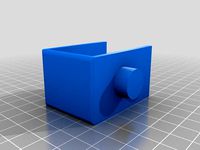
AX12 servo adapters for InMoov by peter_heim
...allow you to use ax12 servos in inmoovs neck. the ax12 provide feed back and speed control which makes for smoother head movments
thingiverse
free
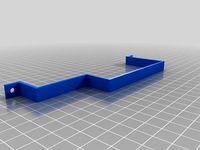
BFR4WD 3D printed parts by BigFace83
...ired to complete the chassis. head pan and tilt parts can be used to create a stand alone robot head using standard hobby servos.
3dwarehouse
free
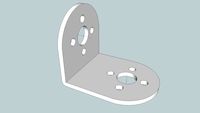
Servo Bracket L
...322, hs422; parallax or futaba ) - black or silver (optional) - dimensions:35x30mm - weight: 10g #bracket #servo #servo_bracket_l
3dwarehouse
free
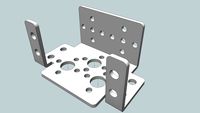
Servo Bracket J
...s422; parallax or futaba ) - black or silver (optional) - demensions: 58x37x25.5mm - weight: 21g #bracket #servo #servo_bracket_j
3dwarehouse
free
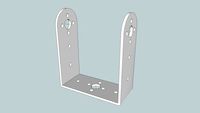
Servo Bracket U
...s422; parallax or futaba ) - black or silver (optional) - demensions: 56x25x62.5mm - weight: 21g #bracket_u #servo #servo_bracket
thingiverse
free
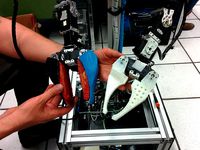
robot gripper dynamixel by TedPro
...pro
thingiverse
a humanoid gripper for two servo controlled grasping. design for dynamixel ax12 servos.
enjoy!
www.tedpro.mx
Robosavvy
thingiverse
free
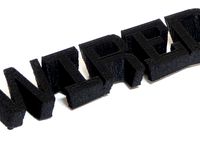
Twisted WIRED by robosavvy
...twisted wired by robosavvy
thingiverse
wired logo with the letters twisted
thingiverse
free
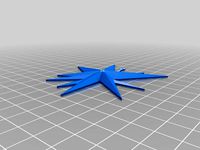
3inch Star by robosavvy
...3inch star by robosavvy
thingiverse
a 3inch star to hang on your christmas tree
thingiverse
free
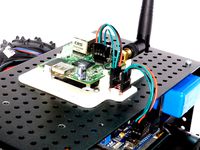
RoboSavvy MiniEMBWiFi Holder by robosavvy
...store/product_info.php/products_id/1928
vex protobot robot kit -> http://robosavvy.com/store/product_info.php/products_id/1770
thingiverse
free
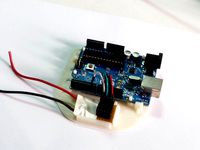
RoboSavvy Arduino Uno Holder for VEX by robosavvy
...iddle to save plastic.
you can see more details of this project in our forum at http://robosavvy.com/forums/viewtopic.php?p=32042
thingiverse
free
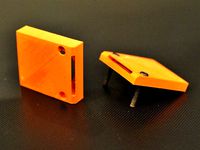
Slim Fan for Ditto+ by robosavvy
...fan duct design for the ditto+ 3d printer based on the rc1 design by tinkerines.
pictured on the right against the regular rc1.
thingiverse
free
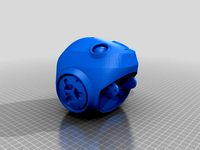
Robot Humanoid Robosavvy design winner unl by Hexx
...d so you can print. this is ridiculously large. i am uploading the head. if anyone does make it, i will convert the entire robot.
thingiverse
free
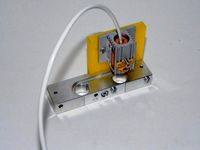
JTechPhotonics laser mount for Robosavvy MM2x kit by hyppyayo
... to have an extruder and the laser.
it allow to mout also a frontal fan to cool the laser (i use the original fan 40x40x10mm)
thingiverse
free
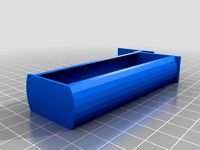
38mm spool holder by robosavvy
...8mm hole and was slipping from the support on the original design.
we modified the stl a bit so it can fit a 38mm spool perfectly
thingiverse
free
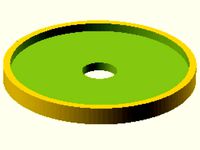
RoboSavvy Filament Spool Supporter Fixes by wmchris
...sc) for the bearings on the outer parts
and
4x mittelhalter for the middle holders
just assemble them like very big washers ;-)
thingiverse
free
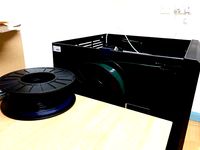
Side Spool Holder (Makerbot Z18) 1KG spool Colorfabb or Robosavvy by MANICX100
...colorfabb & robosavvy 1kg spools of pla
print using standard profile with raft & supports with 30% infill and 4 shells.
Humanoid
turbosquid
$2

Humanoid
...urbosquid
free 3d model humanoid for download as c4d and fbx on turbosquid: 3d models for games, architecture, videos. (1462680)
turbosquid
$30
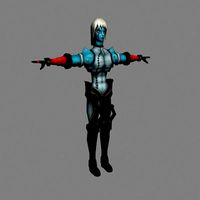
Humanoid
... available on turbo squid, the world's leading provider of digital 3d models for visualization, films, television, and games.
turbosquid
$5
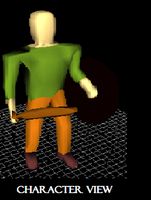
Humanoid
... available on turbo squid, the world's leading provider of digital 3d models for visualization, films, television, and games.
turbosquid
$150

Humanoid Lion
...bosquid
royalty free 3d model humanoid lion for download as on turbosquid: 3d models for games, architecture, videos. (1546414)
turbosquid
$8

humanoid creature
...y free 3d model humanoid creature for download as obj and fbx on turbosquid: 3d models for games, architecture, videos. (1610019)
turbosquid
$47
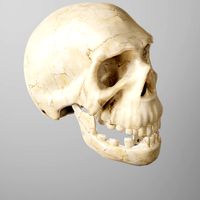
humanoid skull
...model humanoid skull for download as obj, fbx, blend, and stl on turbosquid: 3d models for games, architecture, videos. (1495745)
turbosquid
$59
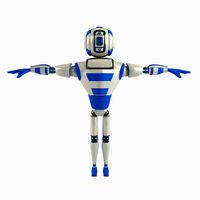
Robot Humanoid
... available on turbo squid, the world's leading provider of digital 3d models for visualization, films, television, and games.
turbosquid
$59
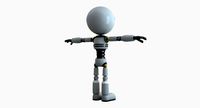
Robot Humanoid
... available on turbo squid, the world's leading provider of digital 3d models for visualization, films, television, and games.
turbosquid
$45
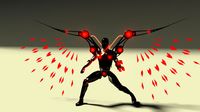
Robot Humanoid
... available on turbo squid, the world's leading provider of digital 3d models for visualization, films, television, and games.
turbosquid
$29
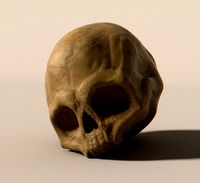
Humanoid Skull
... available on turbo squid, the world's leading provider of digital 3d models for visualization, films, television, and games.
Robot
3d_ocean
$20
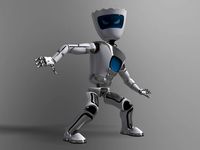
Robot
...robot
3docean
character metal robot robot robotic white
robot model for 3dsmax 2009 and greater
3d_ocean
$45
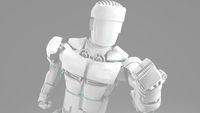
Robot
...robot
3docean
fighing machine robot
a fighting robot from the scrapyard.
3d_ocean
$18
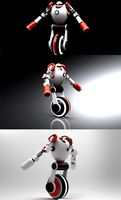
Robot
...robot
3docean
machin robot science fiction
high poly robot.
3d_export
$7
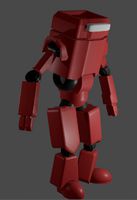
Robot
...robot
3dexport
robot
3d_export
$5
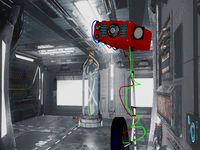
robot
...robot
3dexport
robot
3d_export
free
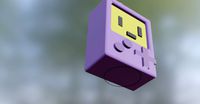
Robot
...robot
3dexport
robot
turbosquid
$10
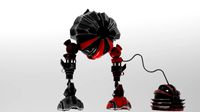
Robot/ Alien Robot
...
royalty free 3d model robot/ alien robot for download as max on turbosquid: 3d models for games, architecture, videos. (1442828)
3d_export
$5

robot
...robot
3dexport
robot in blender
3ddd
$1
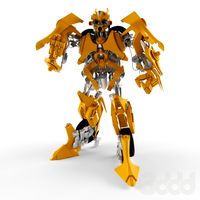
robot
...robot
3ddd
робот
robot
3ddd
$1

Robot
...robot
3ddd
робот
robot
